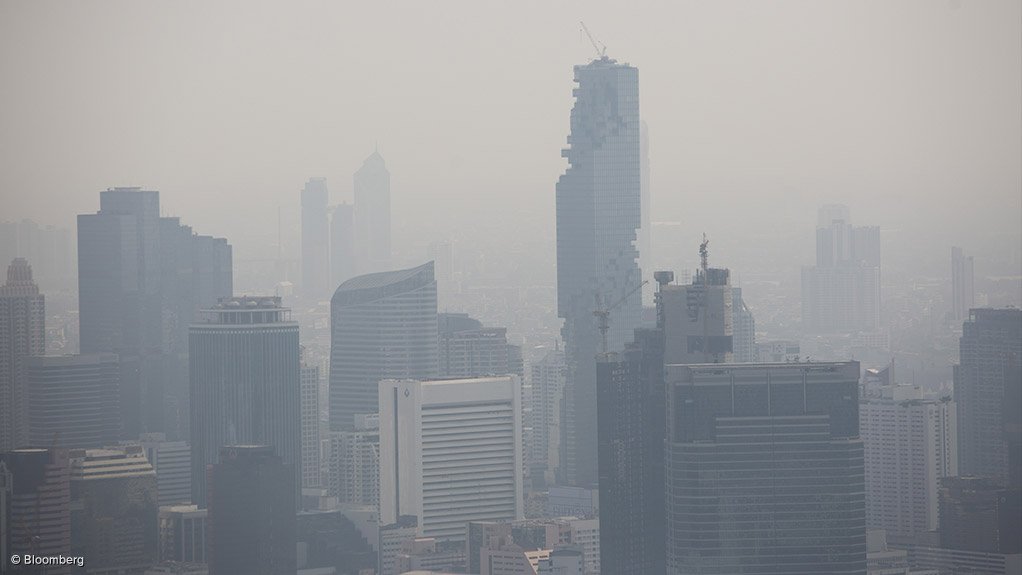Enviro dept invites public comment on sulphur dioxide emissions amendment
The Environmental Affairs Minister has republished for public comment a provision in legislation on minimum emission standards (MES) that allows for a doubling in the amount of harmful pollutant sulphur dioxide companies may emit.
This follows environmental organisation GroundWork’s litigation, instituted last month, seeking to have the provision set aside.
The doubling had been published for implementation on October 31, 2018, without inviting public comment on it as the Air Quality Act requires, GroundWork said in a release published on Thursday.
The Minister has now published a second notice, inviting the public to comment on the same proposed amendment to the MES, which will allow coal-fired boilers to emit double their previously allowed sulphur dioxide pollution from April 2020.
The public comment period will close on June 21.
The Department of Environmental Affairs stated in a separate release that the intention of the amendment is to provide for existing plants to comply with a sulphur dioxide minimum emissions limit of 1 000 mg/Nm3 instead of 500 mg/Nm3.
This means that existing plants would have to reduce their emissions from the current standard of 3 500 mg/Nm3 to 1 000 mg/Nm3.
“While we are relieved that the Minister has finally withdrawn the illegal provision to double sulphur dioxide pollution, GroundWork and other community organisations will not only continue to oppose this proposed doubling, but will fight all efforts to weaken our already poor pollution standards,” said GroundWork director Bobby Peek.
The Centre for Environmental Rights’ Pollution and Climate Change programme head Robyn Hugo pointed out that South African law should be following the global trend of reducing pollution from industrial facilities as a matter of urgency, but instead are demonstrating less commitment to clean air and human health than other developing countries.
She explained in a statement sent to Engineering News Online that the MES formed part of a multistakeholder, multiyear process and, insofar as the MES in question are concerned, have been known since March 2010.
"All of the arguments against flue gas desulphurisation (FGD) were debated and discussed in that process. Ultimately, it was decided that these impacts were outweighed by the benefits – particularly for human health – of retrofitting FGD.
"FGD is implemented all over the world. South Africa is also not expecting industries to do the impossible by requiring coal-fired boilers to meet an MES of 500 mg/Nm3 by April 2020. The reproposed sulphur dioxide emission standard of 1 000 mg/Nm3 is more than 28 times weaker than China’s standard and ten times weaker than India’s. Bear in mind that all of Eskom and Sasol’s operations had already been granted a further five-year postponement to comply with these standards," noted Hugo.
In other words, Hugo said, the State-owned power utility and petrochemicals giant have known about these MES since March 2010 and are only required to comply (apart from those facilities that succeed in their applications for one-off suspensions of compliance) 15 years later.
Having evaluated Eskom’s cost-benefit analysis of additional pollution controls, Dr Michael Holland and Dr Joseph Spadaro found, in a report commissioned by Greenpeace Africa, that the benefits of MES compliance would exceed costs by a significant margin – a factor of five or more. "Eskom substantially underestimates the health impacts of its power stations to try to support their attempt to continue to avoid meeting our weak MES," said Hugo.
She further noted that what polluters need to do to limit pollution is to retrofit various pollution controls onto their stations. But, Eskom and Sasol argue, in short, that the benefits to be achieved by complying with legal pollution standards are simply not worth the costs.
"We are not aware of any other legal regime in South Africa, where affordability is a justifiable excuse not to comply with laws that are in place to protect human health. This is particularly unacceptable, given the way in which this law was developed and how weak our laws are," she concluded.
Comments
Press Office
Announcements
What's On
Subscribe to improve your user experience...
Option 1 (equivalent of R125 a month):
Receive a weekly copy of Creamer Media's Engineering News & Mining Weekly magazine
(print copy for those in South Africa and e-magazine for those outside of South Africa)
Receive daily email newsletters
Access to full search results
Access archive of magazine back copies
Access to Projects in Progress
Access to ONE Research Report of your choice in PDF format
Option 2 (equivalent of R375 a month):
All benefits from Option 1
PLUS
Access to Creamer Media's Research Channel Africa for ALL Research Reports, in PDF format, on various industrial and mining sectors
including Electricity; Water; Energy Transition; Hydrogen; Roads, Rail and Ports; Coal; Gold; Platinum; Battery Metals; etc.
Already a subscriber?
Forgotten your password?
Receive weekly copy of Creamer Media's Engineering News & Mining Weekly magazine (print copy for those in South Africa and e-magazine for those outside of South Africa)
➕
Recieve daily email newsletters
➕
Access to full search results
➕
Access archive of magazine back copies
➕
Access to Projects in Progress
➕
Access to ONE Research Report of your choice in PDF format
RESEARCH CHANNEL AFRICA
R4500 (equivalent of R375 a month)
SUBSCRIBEAll benefits from Option 1
➕
Access to Creamer Media's Research Channel Africa for ALL Research Reports on various industrial and mining sectors, in PDF format, including on:
Electricity
➕
Water
➕
Energy Transition
➕
Hydrogen
➕
Roads, Rail and Ports
➕
Coal
➕
Gold
➕
Platinum
➕
Battery Metals
➕
etc.
Receive all benefits from Option 1 or Option 2 delivered to numerous people at your company
➕
Multiple User names and Passwords for simultaneous log-ins
➕
Intranet integration access to all in your organisation





















